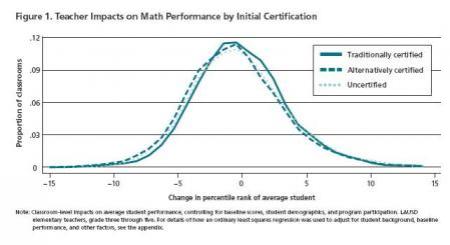
(Guest Post by Matthew Ladner)
About 11 months ago, former Florida Governor Charlie Crist vetoed a major overhaul of teacher pay and tenure as a prelude to running for the Senate as an independent. Yesterday, the Florida Senate passed a revised version of the bill, which the new Florida Governor Rick Scott seems anxious to sign.
Stephen Sawchuck at the Teacher Beat Blog summarized the bill:
Among other things, S. 736:
• Requires 50 percent of a teacher’s evaluation to be based on state standardized tests or other national, local, or industry measures for those subjects not gauged at the state level;
• Requires evaluations to consider four levels of teacher performance;
• As of July 1 of this year, ends the awarding of “continuing” and “professional service” contract status (the Florida equivalent of tenure) and puts all new teachers on annual contracts;
• Permits districts to extend annual contracts only to teachers with good evaluations; those with two “unsatisfactory” ratings in a row, or two “needs improvement” ratings within a three-year period, could not be renewed;
• “Grandfathers” in teachers who now have tenure but allows them to be dismissed for the performance reasons stated above;
• Requires districts to establish performance-based salary schedules by July 1, 2014, for all new hires, and to phase existing teachers onto the new schedules as student-growth measures are developed; and
• Does away with layoffs based on reverse seniority.
Teachers are not interchangeable widgets, and should not be treated as such. Highly effective teachers deserve greater recognition, and the students of highly ineffective teachers deserve better. While merit pay is a complex subject, we can do better than simply paying teachers to age.
Florida once again has raised the bar on education reform for the rest of the nation.


The problem is that school boards, via their administrative hierarchies, treat teachers as if they’re interchangeable widgets. That’s why the unions have swarmed into the public education system.
You can’t have a contract when every employee has skill-sets that are different, valuable and not easily interchangeable. That’s why there aren’t engineer, lawyer unions; the differing value of the employees makes a one-size-fits-all contract impossible.
When teaching skill is more valued, as in, say, when parents determine which school their child attends an accurate and worthwhile merit pay system will become an urgent necessity upon which the survival of the school will depend.
[…] Writing on Jay Greene’s blog, Matthew Ladner observes: “Florida once again has raised the bar on education reform for the rest of the nation.” Higher than even Colorado’s Senate Bill 191, which the Council on Educator Effectiveness is […]
They haven’t raised the bar – they’ve narrowed the focus. The problem is the focus on reform and improvement is myopic and their naive understanding of merit pay’s benefits won’t lead to provable improvement.
Unfortunately, I don’t see merit pay as a particularly promising reform strategy, mostly because it is easily undermined in implementation even if it manages to be adopted as policy (see http://educationnext.org/blocked-diluted-and-co-opted/ ).
Let’s see if FL proves me wrong.
The Florida data system can identify teachers who fail to produce student learning gains year after year. The ability to identify and remove such teachers from the classroom free from tenure alone makes this bill a home run.
I will add some juice to it and maybe a little flour and light soy sauce to make it into a
sauce; making sure to consume it all the sauce.
It is also cholesterol-free and – according to some of the wilder proponents
– can cure anything from Candida to cancer. In Southeast Asia
it is readily available and very inexpensive,
so it has become a staple used in cooking and as a lotion
for skin.